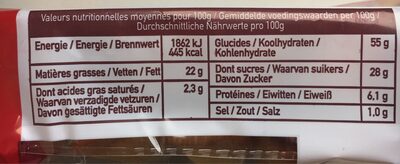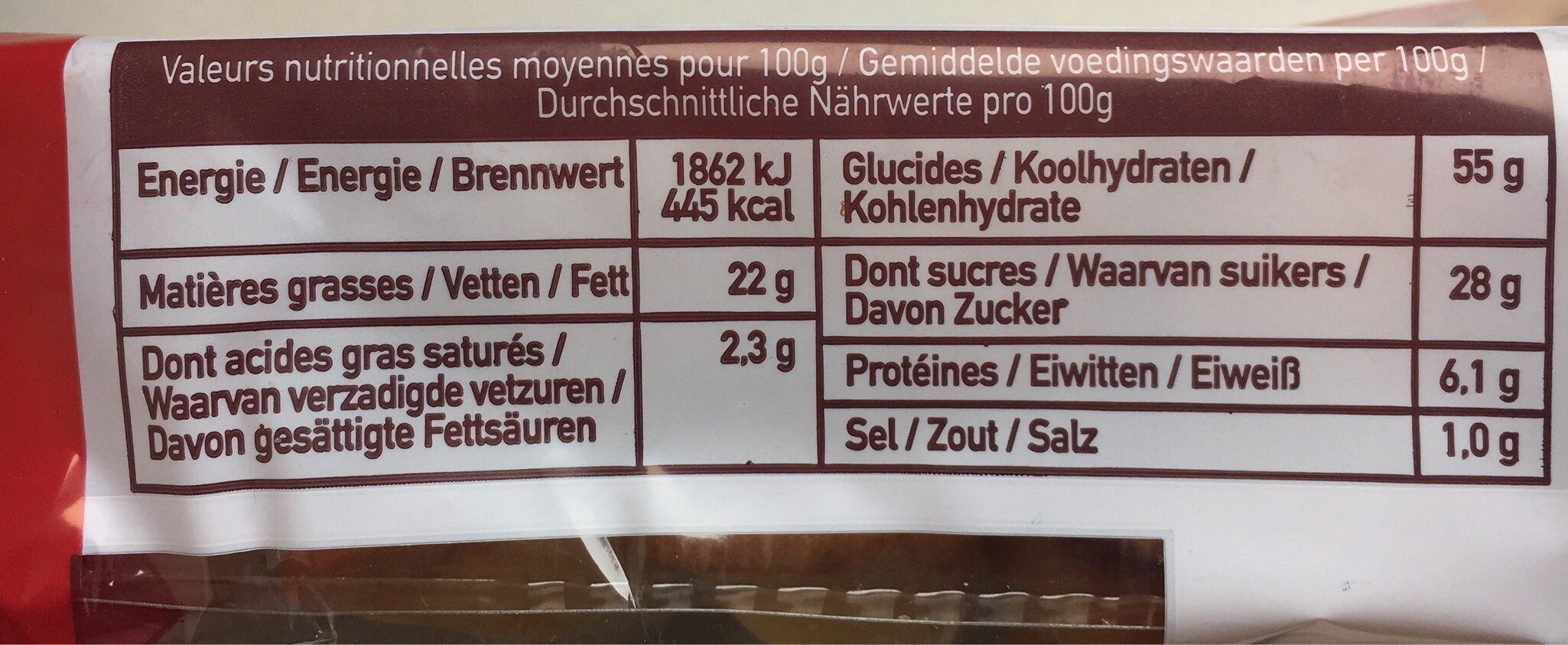Help us make food transparency the norm!
As a non-profit organization, we depend on your donations to continue informing consumers around the world about what they eat.
The food revolution starts with you!
Le Ster - Madeleines Long Original Recipe, 250g (8.8oz)
Le Ster - Madeleines Long Original Recipe, 250g (8.8oz)
This product page is not complete. You can help to complete it by editing it and adding more data from the photos we have, or by taking more photos using the app for Android or iPhone/iPad. Thank you!
×
Barcode: 3252755150005 (EAN / EAN-13)
Quantity: 250g
Brands: Le Ster
Categories: Snacks, Desserts, Sweet snacks, Biscuits and cakes, Cakes, Madeleines, Long madeleines
Labels, certifications, awards: No preservatives, Made in France, No palm oil, fr:Aux oeufs frais
Stores: Intermarché, carrefour.fr
Matching with your preferences
Health
Ingredients
-
18 ingredients
wheat flour, rapeseed oil, fresh eggs 17%, sugar, glucose-fructose syrup, stabilizer: glycerol, lactose and milk proteins, up-and-coming powders (disodium diphosphate, sodium acid carbonate), starch, emulsifier: e471, salt, aromas, thickeners: xanthan gum - gum guarAllergens: Eggs, Gluten, MilkTraces: Nuts, Soybeans
Food processing
-
Ultra processed foods
Elements that indicate the product is in the 4 - Ultra processed food and drink products group:
- Additive: E415 - Xanthan gum
- Additive: E422 - Glycerol
- Additive: E450 - Diphosphates
- Additive: E471 - Mono- and diglycerides of fatty acids
- Ingredient: Emulsifier
- Ingredient: Flavouring
- Ingredient: Glucose
- Ingredient: Thickener
Food products are classified into 4 groups according to their degree of processing:
- Unprocessed or minimally processed foods
- Processed culinary ingredients
- Processed foods
- Ultra processed foods
The determination of the group is based on the category of the product and on the ingredients it contains.
Additives
-
E415 - Xanthan gum
Xanthan gum (E415) is a natural polysaccharide derived from fermented sugars, often used in the food industry as a thickening and stabilizing agent.
This versatile food additive enhances texture and prevents ingredient separation in a wide range of products, including salad dressings, sauces, and gluten-free baked goods.
It is considered safe for consumption even at high intake amounts.
-
E422 - Glycerol
Glycerol: Glycerol -; also called glycerine or glycerin; see spelling differences- is a simple polyol compound. It is a colorless, odorless, viscous liquid that is sweet-tasting and non-toxic. The glycerol backbone is found in all lipids known as triglycerides. It is widely used in the food industry as a sweetener and humectant and in pharmaceutical formulations. Glycerol has three hydroxyl groups that are responsible for its solubility in water and its hygroscopic nature.Source: Wikipedia
-
E450 - Diphosphates
Diphosphates (E450) are food additives often utilized to modify the texture of products, acting as leavening agents in baking and preventing the coagulation of canned food.
These salts can stabilize whipped cream and are also found in powdered products to maintain their flow properties. They are commonly present in baked goods, processed meats, and soft drinks.
Derived from phosphoric acid, they're part of our daily phosphate intake, which often surpasses recommended levels due to the prevalence of phosphates in processed foods and drinks.
Excessive phosphate consumption is linked to health issues, such as impaired kidney function and weakened bone health. Though diphosphates are generally regarded as safe when consumed within established acceptable daily intakes, it's imperative to monitor overall phosphate consumption to maintain optimal health.
-
E471 - Mono- and diglycerides of fatty acids
Mono- and diglycerides of fatty acids (E471), are food additives commonly used as emulsifiers in various processed foods.
These compounds consist of glycerol molecules linked to one or two fatty acid chains, which help stabilize and blend water and oil-based ingredients. E471 enhances the texture and shelf life of products like margarine, baked goods, and ice cream, ensuring a smooth and consistent texture.
It is generally considered safe for consumption within established regulatory limits.
-
E500 - Sodium carbonates
Sodium carbonates (E500) are compounds commonly used in food preparation as leavening agents, helping baked goods rise by releasing carbon dioxide when they interact with acids.
Often found in baking soda, they regulate the pH of food, preventing it from becoming too acidic or too alkaline. In the culinary world, sodium carbonates can also enhance the texture and structure of foods, such as noodles, by modifying the gluten network.
Generally recognized as safe, sodium carbonates are non-toxic when consumed in typical amounts found in food.
Ingredients analysis
-
May contain palm oil
Ingredients that may contain palm oil: E471
-
Non-vegan
Non-vegan ingredients: Fresh egg, Skimmed milk powderSome ingredients could not be recognized.
We need your help!
You can help us recognize more ingredients and better analyze the list of ingredients for this product and others:
- Edit this product page to correct spelling mistakes in the ingredients list, and/or to remove ingredients in other languages and sentences that are not related to the ingredients.
- Add new entries, synonyms or translations to our multilingual lists of ingredients, ingredient processing methods, and labels.
If you would like to help, join the #ingredients channel on our Slack discussion space and/or learn about ingredients analysis on our wiki. Thank you!
-
Vegetarian status unknown
Unrecognized ingredients: fr:gomme-xanthane-gomme-guarSome ingredients could not be recognized.
We need your help!
You can help us recognize more ingredients and better analyze the list of ingredients for this product and others:
- Edit this product page to correct spelling mistakes in the ingredients list, and/or to remove ingredients in other languages and sentences that are not related to the ingredients.
- Add new entries, synonyms or translations to our multilingual lists of ingredients, ingredient processing methods, and labels.
If you would like to help, join the #ingredients channel on our Slack discussion space and/or learn about ingredients analysis on our wiki. Thank you!
-
Details of the analysis of the ingredients
We need your help!
Some ingredients could not be recognized.
We need your help!
You can help us recognize more ingredients and better analyze the list of ingredients for this product and others:
- Edit this product page to correct spelling mistakes in the ingredients list, and/or to remove ingredients in other languages and sentences that are not related to the ingredients.
- Add new entries, synonyms or translations to our multilingual lists of ingredients, ingredient processing methods, and labels.
If you would like to help, join the #ingredients channel on our Slack discussion space and/or learn about ingredients analysis on our wiki. Thank you!
: Farine de blé, huile de colza, œufs frais 17%, sucre, sirop de glucose-fructose, stabilisant (glycérol), lait écrémé en poudre, poudres à lever (diphosphates), carbonates de sodium, amidon, émulsifiant (e471), sel, arômes, épaississants (gomme xanthane-gomme guar)- Farine de blé -> en:wheat-flour - vegan: yes - vegetarian: yes - ciqual_proxy_food_code: 9410 - percent_min: 17 - percent_max: 66
- huile de colza -> en:colza-oil - vegan: yes - vegetarian: yes - from_palm_oil: no - ciqual_food_code: 17130 - percent_min: 17 - percent_max: 41.5
- œufs frais -> en:fresh-egg - vegan: no - vegetarian: yes - ciqual_food_code: 22000 - percent_min: 17 - percent: 17 - percent_max: 17
- sucre -> en:sugar - vegan: yes - vegetarian: yes - ciqual_proxy_food_code: 31016 - percent_min: 0 - percent_max: 17
- sirop de glucose-fructose -> en:glucose-fructose-syrup - vegan: yes - vegetarian: yes - ciqual_food_code: 31077 - percent_min: 0 - percent_max: 17
- stabilisant -> en:stabiliser - percent_min: 0 - percent_max: 16.5
- glycérol -> en:e422 - vegan: maybe - vegetarian: maybe - percent_min: 0 - percent_max: 16.5
- lait écrémé en poudre -> en:skimmed-milk-powder - vegan: no - vegetarian: yes - ciqual_food_code: 19054 - percent_min: 0 - percent_max: 13.2
- poudres à lever -> en:raising-agent - percent_min: 0 - percent_max: 11
- diphosphates -> en:e450 - vegan: yes - vegetarian: yes - percent_min: 0 - percent_max: 11
- carbonates de sodium -> en:e500 - vegan: yes - vegetarian: yes - percent_min: 0 - percent_max: 9.42857142857143
- amidon -> en:starch - vegan: yes - vegetarian: yes - ciqual_proxy_food_code: 9510 - percent_min: 0 - percent_max: 8.25
- émulsifiant -> en:emulsifier - percent_min: 0 - percent_max: 7.33333333333333
- e471 -> en:e471 - vegan: en:yes - vegetarian: en:yes - from_palm_oil: maybe - percent_min: 0 - percent_max: 7.33333333333333
- sel -> en:salt - vegan: yes - vegetarian: yes - ciqual_food_code: 11058 - percent_min: 0 - percent_max: 1
- arômes -> en:flavouring - vegan: maybe - vegetarian: maybe - percent_min: 0 - percent_max: 1
- épaississants -> en:thickener - percent_min: 0 - percent_max: 1
- gomme xanthane-gomme guar -> fr:gomme-xanthane-gomme-guar - percent_min: 0 - percent_max: 1
Nutrition
-
Poor nutritional quality
⚠ ️Warning: the amount of fiber is not specified, their possible positive contribution to the grade could not be taken into account.⚠ ️Warning: the amount of fruits, vegetables and nuts is not specified on the label, it was estimated from the list of ingredients: 29This product is not considered a beverage for the calculation of the Nutri-Score.
Positive points: 0
- Proteins: 3 / 5 (value: 6.1, rounded value: 6.1)
- Fiber: 0 / 5 (value: 0, rounded value: 0)
- Fruits, vegetables, nuts, and colza/walnut/olive oils: 0 / 5 (value: 29.25, rounded value: 29.3)
Negative points: 17
- Energy: 5 / 10 (value: 1862, rounded value: 1862)
- Sugars: 6 / 10 (value: 28, rounded value: 28)
- Saturated fat: 2 / 10 (value: 2.3, rounded value: 2.3)
- Sodium: 4 / 10 (value: 400, rounded value: 400)
The points for proteins are not counted because the negative points are greater or equal to 11.
Nutritional score: (17 - 0)
Nutri-Score:
-
Nutrient levels
-
Fat in high quantity (22%)
What you need to know- A high consumption of fat, especially saturated fats, can raise cholesterol, which increases the risk of heart diseases.
Recommendation: Limit the consumption of fat and saturated fat- Choose products with lower fat and saturated fat content.
-
Saturated fat in moderate quantity (2.3%)
What you need to know- A high consumption of fat, especially saturated fats, can raise cholesterol, which increases the risk of heart diseases.
Recommendation: Limit the consumption of fat and saturated fat- Choose products with lower fat and saturated fat content.
-
Sugars in high quantity (28%)
What you need to know- A high consumption of sugar can cause weight gain and tooth decay. It also augments the risk of type 2 diabetes and cardio-vascular diseases.
Recommendation: Limit the consumption of sugar and sugary drinks- Sugary drinks (such as sodas, fruit beverages, and fruit juices and nectars) should be limited as much as possible (no more than 1 glass a day).
- Choose products with lower sugar content and reduce the consumption of products with added sugars.
-
Salt in moderate quantity (1%)
What you need to know- A high consumption of salt (or sodium) can cause raised blood pressure, which can increase the risk of heart disease and stroke.
- Many people who have high blood pressure do not know it, as there are often no symptoms.
- Most people consume too much salt (on average 9 to 12 grams per day), around twice the recommended maximum level of intake.
Recommendation: Limit the consumption of salt and salted food- Reduce the quantity of salt used when cooking, and don't salt again at the table.
- Limit the consumption of salty snacks and choose products with lower salt content.
-
-
Nutrition facts
Nutrition facts As sold
for 100 g / 100 mlCompared to: Long madeleines Energy 1,862 kj
(445 kcal)+2% Fat 22 g +3% Saturated fat 2.3 g -31% Carbohydrates 55 g - Sugars 28 g -1% Fiber ? Proteins 6.1 g +7% Salt 1 g +21% Fruits‚ vegetables‚ nuts and rapeseed‚ walnut and olive oils (estimate from ingredients list analysis) 29.25 %
Environment
-
Eco-Score B - Low environmental impact
⚠ ️Select a country in order to include the full impact of transportation.The Eco-Score is an experimental score that summarizes the environmental impacts of food products.→ The Eco-Score was initially developped for France and it is being extended to other European countries. The Eco-Score formula is subject to change as it is regularly improved to make it more precise and better suited to each country.Life cycle analysis
-
Average impact of products of the same category: B (Score: 78/100)
Category: Madeleine biscuit (cookie)
Category: Madeleine biscuit (cookie)
- PEF environmental score: 0.29 (the lower the score, the lower the impact)
- including impact on climate change: 1.95 kg CO2 eq/kg of product
Stage Impact Agriculture
71.9 %Processing
15.2 %Packaging
6.5 %Transportation
4.7 %Distribution
1.7 %Consumption
0.0 %
Bonuses and maluses
-
Missing origins of ingredients information
Malus: -5
⚠ ️ The origins of the ingredients of this product are not indicated.
If they are indicated on the packaging, you can modify the product sheet and add them.
If you are the manufacturer of this product, you can send us the information with our free platform for producers.
-
Packaging with a medium impact
Malus: -10
Shape Material Recycling Impact Tray Plastic High
Eco-Score for this product
-
Impact for this product: B (Score: 63/100)
Product: Le Ster - Madeleines Long Original Recipe, 250g (8.8oz)
Life cycle analysis score: 78
Sum of bonuses and maluses: -15
Final score: 63/100
-
Carbon footprint
-
Equal to driving 1.0 km in a petrol car
195 g CO² per 100g of product
The carbon emission figure comes from ADEME's Agribalyse database, for the category: Madeleine biscuit (cookie) (Source: ADEME Agribalyse Database)
Stage Impact Agriculture
62.4 %Processing
13.6 %Packaging
14.8 %Transportation
8.2 %Distribution
1.0 %Consumption
0.0 %
Packaging
-
Packaging with a medium impact
-
Packaging parts
Tray (Plastic)
-
Packaging materials
Material % Packaging weight Packaging weight per 100 g of product Plastic
-
Transportation
-
Origins of ingredients
Missing origins of ingredients information
⚠ ️ The origins of the ingredients of this product are not indicated.
If they are indicated on the packaging, you can modify the product sheet and add them.
If you are the manufacturer of this product, you can send us the information with our free platform for producers.Add the origins of ingredients for this product Add the origins of ingredients for this product
Report a problem
-
Incomplete or incorrect information?
Category, labels, ingredients, allergens, nutritional information, photos etc.
If the information does not match the information on the packaging, please complete or correct it. Open Food Facts is a collaborative database, and every contribution is useful for all.
Data sources
Product added on by tacite
Last edit of product page on by foodvisor.
Product page also edited by asmoth, date-limite-app, driveoff, ecoscore-impact-estimator, flamand-rose, inf, kiliweb, off.71504736-62db-40a3-af30-1837f48406b2, openfoodfacts-contributors, packbot, quechoisir, roboto-app, segundo, thaialagata, thedarkpassenger, yuka.R3JzNkh2d2EvOFF1dVBRVTVVdmJ3LzEwL1o3eURXenRNYmNXSVE9PQ, yuka.SGFsWUFyNGcrT1lvbE1jWDNTeU4rSUpZeTdPcldqS3ZEN1l6SVE9PQ, yuka.YjcwRERxOGF2NlFCbzh3MytUWDArZFlvLzg2S2YwQ3hjclFKSVE9PQ, yuka.ZktVNUxJb2xvOW9OcDhRLzFCNzN3OHNrN0xpVmNIMjdFL1ZKSVE9PQ, yuka.sY2b0xO6T85zoF3NwEKvlkZoDPb0uxvPBkHttm6MxvazK5a1RMlrwKT5b6s.










